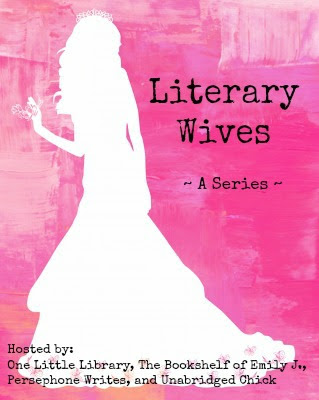Today is another review for the Literary Wives blogging club, in which we discuss the depiction of wives in fiction. If you have read the book, please participate by leaving comments on any of our blogs.
Be sure to read the reviews and comments of the other wives!
- Lynn of Smoke and Mirrors
- Naomi of Consumed By Ink
Literary Wives Needs Your Help!
Recently, we’ve had some members resign, and we will miss them. Now we feel we are getting a little small for a club unless we can recruit a few new members. If you are interested in becoming one, please let one of us know.
What Does Membership Involve?
Although we started out as all wives, that’s not a requirement. Now we would just like people who are interested in reading and discussing how literature depicts wives and marriage. You will need to have your own blog on which to post your reviews so that we can link to it. We read four books a year and try to post our reviews on the same day. These days are the first Monday in March, June, September, and December.
When Would I Begin Working with the Club?
Our next book review isn’t until June, so it’s up to you to decide how much time you need to finish the book. However, right now, we are just beginning to select books for the next couple of years. Members are more engaged at this time in looking at lists of books, reading about them, and voting for their choices. We only do this every other year, but we will begin this process as soon as we get new members.
My Review
What seems at first to be a funny chick lit novel becomes a little more serious with a plot twist. Lately Penelope Ruiz-Kar feels like she’s barely keeping her head above water. She’s the main supporter of her family while her husband Sanjay sells an occasional article. But her job as a fundraiser for a university is stressful and requires a lot of overtime. (Although, just a little comment. The character mentions 50 hours a week, which for people in high tech is not a lot of overtime. Things are changing, though, which is good.) Sanjay doesn’t pick up much of the slack at home, and her youngest child, Miles, wakes her up every night, having wet his bed. She just feels exhausted.
She envies her best friend Jenny Sweet, who seems to lead a perfect life. Although Jenny’s husband Matt travels a lot for work, he seems to adore her, and they are financially better off than the Kars. But Penelope’s illusions are shattered when Jenny dies of an accidental overdose of opiates. Penelope wonders how she could not have noticed that Jenny was in trouble.
When Matt tells Penny that his marriage was in terrible shape despite appearances, she begins to think she needs to work on hers. After a discussion with Sanjay, they decide to give each other a list of things they would like the other to change. I wonder how they thought that would turn out?
This novel is entertaining and well written, but despite a few glitches at first, it went for too easy resolutions. Everyone should have such a near-perfect husband. The end result felt like chick lit after all.
What does this book say about wives or the experience of being a wife?
Pagán picks a common problem—the difficulties of a working mother. And these difficulties seem realistically portrayed, especially for a woman whose husband’s role as a house husband has largely lapsed without his taking on other duties. This is a fairly good marriage despite the couple’s difficulties, because Sanjay reacts reasonably to Penny’s suggestions (there are many husbands who wouldn’t), and even though they’re in a slump, he’s affectionate to her. It is actually Penny’s personal problem that interferes most with her job and at home, and that’s her pretending everything is okay and not asking for what she needs.
The miracle, and the thing that seems a little unrealistic to me, is that when she begins asking, she begins getting what she needs.







 What does the book say about wives or about the experience of being a wife? In what way does this woman define “wife”—or in what way is she defined by “wife”?
What does the book say about wives or about the experience of being a wife? In what way does this woman define “wife”—or in what way is she defined by “wife”?




